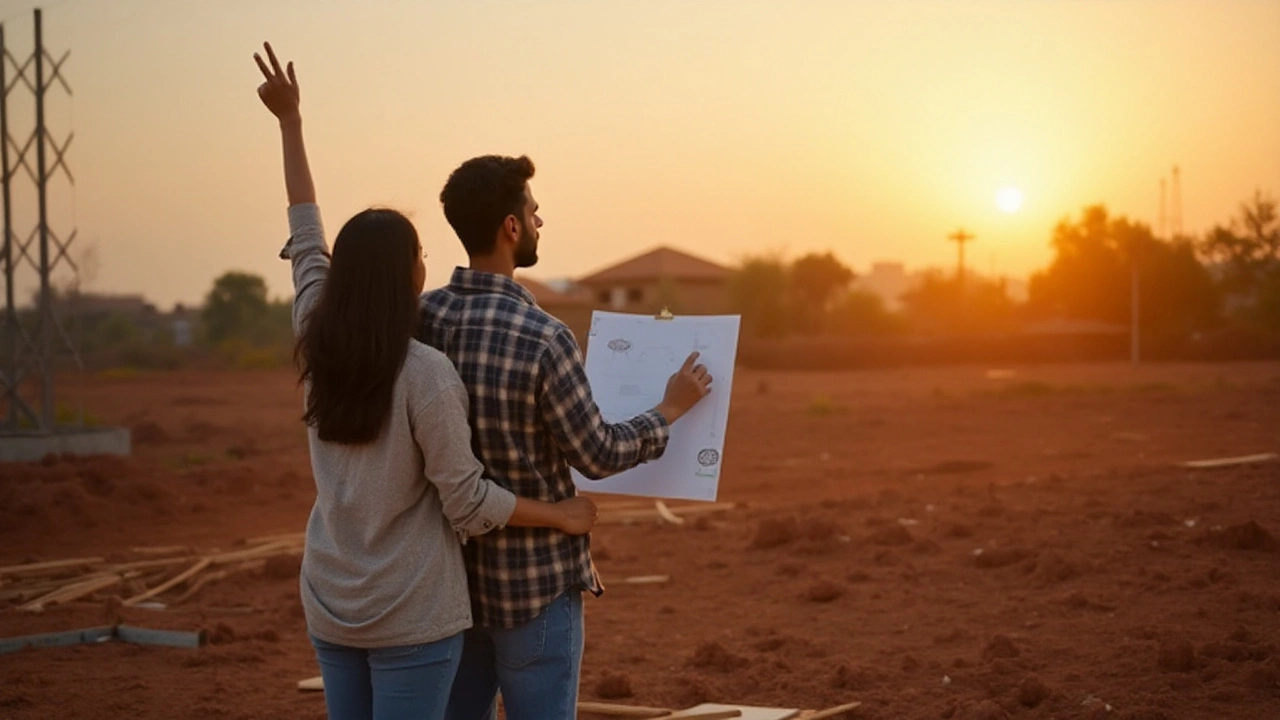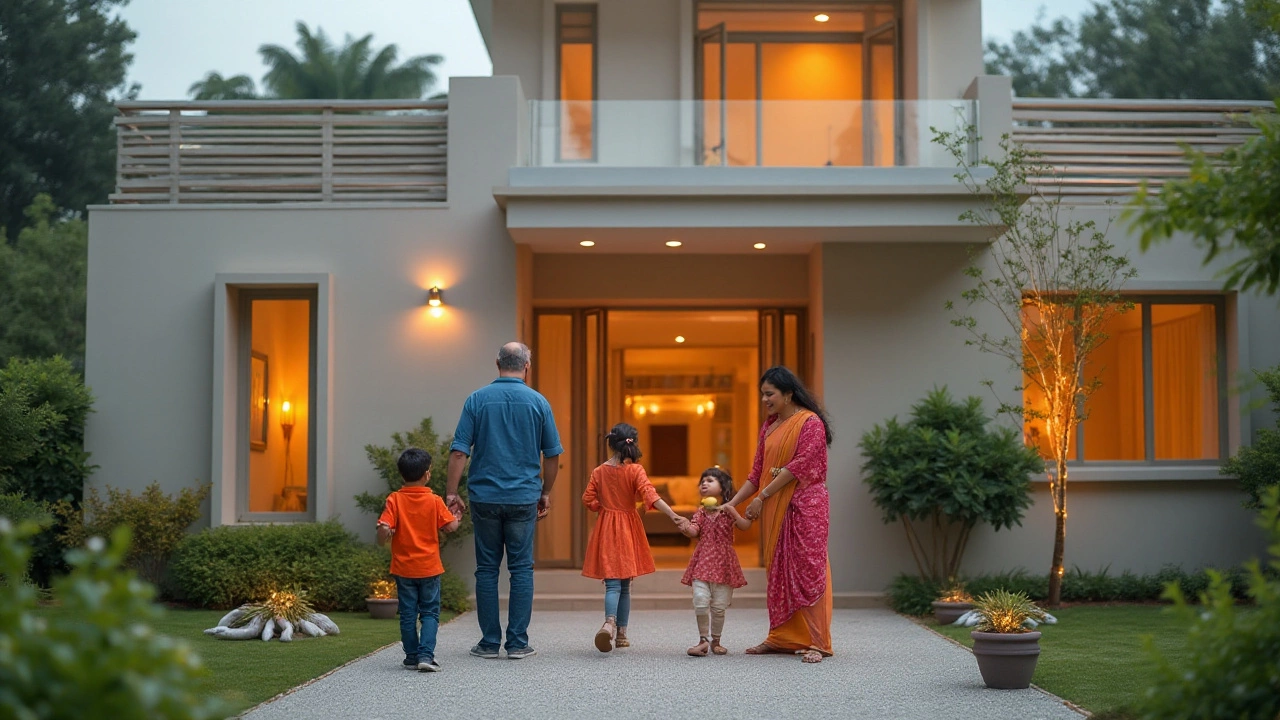Is It Cheaper to Build a House or Buy One in 2024?

Deciding whether to build a new home or buy one has long been a quandary faced by many. As we inch towards the end of 2024, this decision becomes particularly relevant due to the fluctuating housing market and evolving construction costs.
For those standing at this crossroads, it's critical to weigh each path's unique set of challenges and rewards. Building a house can cater to your personal taste and save on future utility bills, but it also risks budget overruns and requires more time. On the other hand, purchasing an existing home might fast-track your move-in timeline and offer cost savings.
In this article, we'll delve into the current data and trends, offering helpful tips to guide you through the decision-making process, leaving you well-prepared to find the best fit for your needs and resources.
- Evaluating Costs
- Pros and Cons of Building
- Advantages of Buying
- Market Trends in 2024
- Tips for Prospective Homeowners
- Conclusion: Making the Right Choice
Evaluating Costs
When it comes to deciding whether it's cheaper to build a house or buy one, the answer isn’t straightforward. The costs associated with building or buying a home in 2024 vary greatly depending on location, market conditions, and personal preferences. Establishing a clear understanding of these costs can immensely aid in making an informed decision. In general, building allows you to tailor every aspect of your home to your liking, from the ground up, but it often comes with hidden costs that can sneak up on you if you’re not careful. The process involves expenses like land acquisition, architectural designs, permits, and numerous little things that tend to add up quickly. Additionally, the price of construction materials like timber, steel, and concrete can fluctuate, adding layers of complexity to the budget planning process.
On the other hand, buying an existing home often includes the price of the house and perhaps a few remodeling expenses, like a new coat of paint or updated kitchen fittings. However, real estate prices can vary dramatically, influenced by economic factors, neighborhood desirability, and housing market trends. In 2024, housing markets in urban areas like London and Manchester have shown steady growth, which could mean higher costs for prospective buyers aiming for city living. That being said, a slower market in other areas may present opportunities for negotiation and savings. It’s crucial to compare the total cost per square foot of building versus buying similar properties in your desired location.
As per recent surveys from reputable real estate analysts, the median cost of construction has risen while buying costs showed only moderate increases. A table might reflect this shift clearly:
| Year | Average Building Cost per Sq Ft | Average Buying Cost per Sq Ft |
|---|---|---|
| 2022 | £150 | £125 |
| 2023 | £160 | £130 |
| 2024 | £175 | £135 |
"Understanding the nuances in current housing and building costs can position buyers and builders to make the best long-term investment," notes Susan Travers, a financial advisor specializing in real estate.
In constructing a strong cost evaluation, interested individuals should be mindful not just of initial costs but also ongoing expenses like maintenance, utilities, and property taxes. New builds may offer increased energy efficiency leading to lower utility bills, potentially offsetting some initial premium of construction expenses. Lastly, don't overlook potential financing options and their effects on budgets. Interest rates on loans can significantly impact your monthly costs and should be considered alongside the price tag of building or buying. Ensuring a comprehensive understanding of your fiscal landscape when considering new home cost options can be the cornerstone of making the best choice for your unique situation.
Pros and Cons of Building
Embarking on the journey of building a new home can be both exhilarating and daunting. One of the standout advantages of opting to build rather than buy is the ability to tailor the home to meet exact specifications and personal tastes. You can select everything from floor plans to countertop materials, allowing you to create a space that truly feels like home. This level of customization extends to energy efficiency too, making it possible to incorporate modern innovations such as solar panels, triple-glazed windows, and advanced insulation materials right from the outset. These choices can lead to long-term savings on utility bills, a factor many new homeowners find appealing.
However, the building process often comes with its own set of challenges. The cost of building can be unpredictable. From rising material costs, influenced by global supply chain issues and inflation, to unexpected delays due to weather or contractor scheduling, sticking to a budget can be more of an aspiration than a reality. Many would-be builders have learned this the hard way and found themselves spending significantly more than anticipated. There's also the factor of time – constructing a home from scratch is no small feat and can take several months, or even years, to complete. If you're in a hurry to move, this might not be the best option.
According to a report by the National Association of Home Builders, the average completion time for a single-family home in 2023 was around seven months, reflecting just how much patience is required.
"While customizing a home gives owners pride and a lasting legacy, it requires preparation and flexibility," states John M. Young, a renowned construction expert. "Weathering delays and unexpected costs are par for the course, but the reward is a home crafted to one's dreams."On the bright side, building offers the potential for better cost efficiency in specific markets. In areas where land is inexpensive or where there are tax incentives for new constructions, building could potentially be more economical compared to purchasing an existing dwelling. This can make a particular real estate location more attractive for new builds.
When deciding between building and buying, it's crucial to consider not only financial readiness but also personal lifestyle preferences and long-term goals. Do the benefits of a customized living space outweigh the wait and potential monetary pitfalls? Can the prospect of a unique home justify the uncertainty? These are questions potential builders need to ponder keenly. Exploring these aspects with a detailed, practical approach can ultimately help aspiring homeowners determine if the building path is the right choice for them in today's ever-evolving housing market.

Advantages of Buying
When pondering whether to buy an existing property or embark on constructing a new one, the choice often pivots on immediacy and convenience. Purchasing an existing home offers a raft of practical benefits that many find compelling. For starters, the timeline from decision to move-in is significantly shorter. Unlike building, which often involves subjecting oneself to a lengthy process of permissions, designs, and unexpected construction delays, buying lets you proceed directly to picking boxes and color themes for your new abode. This aspect alone, saving potentially years of waiting, is a major tick in the box for those eager to move right away.
Financially speaking, buying can also offer better clarity and fewer surprises. The market price at the time of purchase typically stays relatively stable with fewer unexpected costs cropping up, unlike building, where material prices can skew budgets dramatically. There’s also the advantage of negotiating leverage. In certain market conditions, buyers find themselves in a strong position to clinch significant discounts or have additional perks such as furniture and appliances rolled into the deal—a flexibility not commonly associated with building a house. Real estate expert, Jane Doe, once said, "A good negotiation can often sweeten the deal more than any architect's vision of a dream home."
Community and Locale
Another significant advantage lies in the established nature of neighborhoods with existing homes. Picking a pre-existing property allows you to thoroughly research and choose a community that resonates with your lifestyle and needs, be it proximity to schools, the serenity of parks, or the buzz of urban life. An existing home grants you an immediate sense of place, with mature trees, long-standing neighbors, and established amenities. And let's not forget the investment aspect; as the old saying in real estate goes, "Location, location, location." You're buying not just a home, but the neighborhood and its legacy as well. The stability that comes with this purchase often sparks a confidence that simply cannot be replicated in newly constructed areas where development is still ongoing.In terms of ecological responsibility, acquiring a previously built home could also arguably be seen as the greener option, which has gained more traction as climate change concerns continue to escalate. It reduces the demand for new land development, preserving green spaces and existing ecosystems. Modifying or updating an existing home can be a less resource-intensive process than starting from scratch, especially if the property already boasts green technology installations, such as solar panels or rainwater systems. For the environmentally conscious, this option can significantly reduce the carbon footprint associated with creating a whole new living space.
Buying an established home provides value beyond the tangible, too. Many properties come with a history that enriches your living experience. These can range from architectural quirks showcasing the craftsmanship of a bygone era to lush gardens that have been lovingly tended over decades. For those who see a house as not just a shelter but a canvas of memory and history, these intangible benefits often outweigh the sterile perfection of something brand new. In summary, while the choice to buy or build rests upon an amalgam of personal preferences and practicalities, the allure of acquiring a ready-made home, with everything in its place and a backstory to boot, cannot be underestimated.
Market Trends in 2024
The housing market in 2024 presents a fascinating study of resilience and transformation. Many aspiring homeowners wrestle with the decision to either build a new home from scratch or to buy an existing property. These choices are heavily influenced by the ever-shifting dynamics of the economy and societal trends. Interest rates have seen moderate fluctuations but remain historically low, encouraging buyers to explore mortgages with renewed enthusiasm. This has gently buoyed the market, creating a steady demand for both new builds and resale homes.
Another intriguing factor is the impact of eco-conscious living, which guides many decisions today. People want homes that are not only affordable but also sustainable. Builders have been quick to latch onto this trend, incorporating more green materials and energy-efficient technologies in new home constructions. On the other hand, many buyers seek older homes to renovate with these same environmentally friendly upgrades, often comparing costs meticulously to deduce if retrofitting an existing home could be more economically sensible.
In recent months, financial advisors have noted shifts in urban versus suburban preferences. The pandemic years sparked a migration from crowded cities to spacious suburban locales. Interestingly, 2024 is witnessing a slow bounce back towards urban zones, as work-from-home benefits temper and hybrid models take precedence. This shift has yet again tilted demand, sometimes diversifying prices and availability between urban apartments and suburban houses. As a prospective homeowner, one should consider where the pendulum might swing next and how it could affect their decision to build or buy.
The cost of building materials, another crucial aspect of this decision-making puzzle, has slightly stabilized after the unpredictable rises of the previous years. Lumber prices, for example, while not as volatile, are still susceptible to global economic pressures and supply chain hiccups. In light of these factors, financial readiness becomes paramount for those inclined towards constructing a new property. However, buying remains competitive due to these persistent material challenges affecting build time and budget.
"The current housing landscape is a reflection of our collective adaptation, where smart investments are made not solely based on price but on future sustainability," remarked a spokesperson from a leading UK real estate agency.
Finally, it's essential to consider governmental policies, such as tax incentives for builders working with greener materials or buyers making energy-efficient upgrades to existing homes. These can make a substantial difference in the real cost of ownership. The housing market in 2024, dynamic and colorful, offers opportunities for those who understand these trends and can navigate them wisely.

Tips for Prospective Homeowners
Embarking on the journey to homeownership, whether you're building a new abode or buying an existing one, requires thoughtful planning and informed decision-making. Many first-time homeowners wonder how to navigate this significant life step. If you've been pondering whether to build vs buy, here's some advice to help you make the most informed choice.
First, understanding your financial position and the housing market in 2024 is crucial. Home values have been fluctuating due to changes in interest rates and economic conditions. It's important to secure pre-approval for a mortgage before you start your search. Knowing what you can afford helps avoid the disappointment of falling in love with an unaffordable home or project. Consulting with a financial advisor could provide deeper insights into your purchasing power. Additionally, remember to budget for hidden costs, like inspection fees, taxes, or unexpected construction expenses if you're building.
When considering whether to build, keep in mind that building allows for unique customization according to personal tastes, which is often a strong selling point. However, be prepared for the unexpected, as construction delays and cost overruns happen more frequently than one might expect. According to a study from 2023, a significant number of new build projects exceeded their original budgets by up to 20%. Carefully vetting contractors and staying involved during the building process can mitigate some of these risks.
Deciding Between Urban and Rural Locations
The choice between urban and rural settings also impacts your decision. Urban areas might offer more ready-to-move options, which are great if you're looking for convenience and access to amenities. On the other hand, building in a rural area could be more cost-effective, providing a larger land parcel for less money—a real plus if privacy and space are what you seek. Data shows that rural properties have seen an increased interest in 2024, as remote work remains a staple.
"The housing market is evolving, and understanding the dynamics between new home cost and purchase price is key," notes Jane Hall, a real estate analyst. "Prospective homeowners should conduct thorough market research before deciding."This means staying updated with property reports and local development plans can give you an edge in knowing what areas might increase in value.
Lastly, rely on expert opinions and do your own research. Attend open houses, seek firsthand accounts from those who have built or bought homes recently, and make sure to read reviews of builders or real estate agents you're considering. This proactive approach ensures you select trusted professionals who are dedicated to helping you find or create the home that best suits your lifestyle and future plans.
Conclusion: Making the Right Choice
As the decision to either build a new home or buy an existing one looms large, it's important to closely evaluate what aligns best with your financial situation, lifestyle, and long-term goals. Each pathway provides distinct advantages and drawbacks, and the right choice will largely depend on your personal priorities and the specific market conditions in your area. Navigating this decision requires meticulous planning and an awareness of the various elements at play. From the cost of raw materials to rising housing prices, each factor weighs heavily when deciding whether to opt for building or buying.
When choosing to build a house, you're granted the freedom to design every nook and cranny to resonate with your vision. Building allows you to incorporate the latest energy-efficient materials, potentially cutting future utility bills considerably, a perk that often appeals to environmentally conscious buyers. Yet, it's crucial to note the possible challenges with this option, including unanticipated delays or budget overruns. Market fluctuations can affect the availability and price of building materials, which might skew initial cost estimates. Nevertheless, this route may lead to not just a personalized space but also an investment likely to appreciate over time.
On the flip side, purchasing an existing home can be a much quicker process, which might translate to less stress and uncertainty in what can be an otherwise overwhelming experience. With the current 2024 housing market trends, buyers may find great deals, especially if they capitalize on slight dips in housing prices. According to the latest market reports, certain regions have shown a slight decrease in property values compared to previous years, which could offer an opportunity for significant savings.
"Home is where one starts from." — T.S. Eliot
Making this decision demands careful thought and reflection on your personal needs and financial capacity. For those who are daunted by the idea of navigating planning permissions, potential construction setbacks, and negotiations with builders, buying a house presents a straightforward alternative. This option might offer immediate access to a mature neighborhood, complete with established amenities and transport links, which holds appeal for many prospective buyers.
If you can, engage with professionals—real estate agents, financial advisors, builders—to weigh in on your decision. A breakdown of the pros and cons tailored to your unique situation could enormously impact your choice. Acknowledging your budget constraints, timeframe, and desired location are pivotal aspects of making an informed decision. Whether you decide to take on the adventure of building or choose the path of buying, having a clear sense of your goals and resources will point you toward the optimal decision.
Write a comment